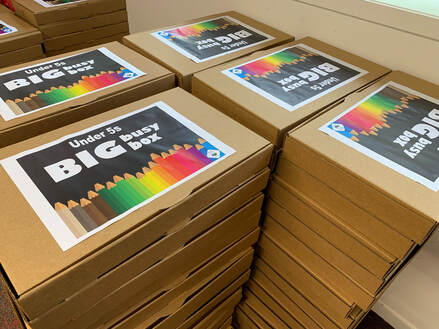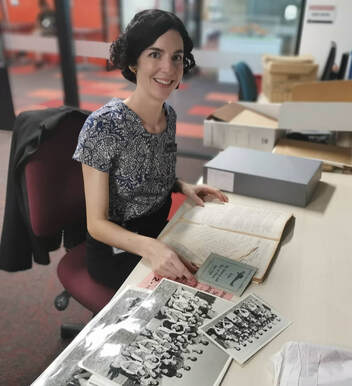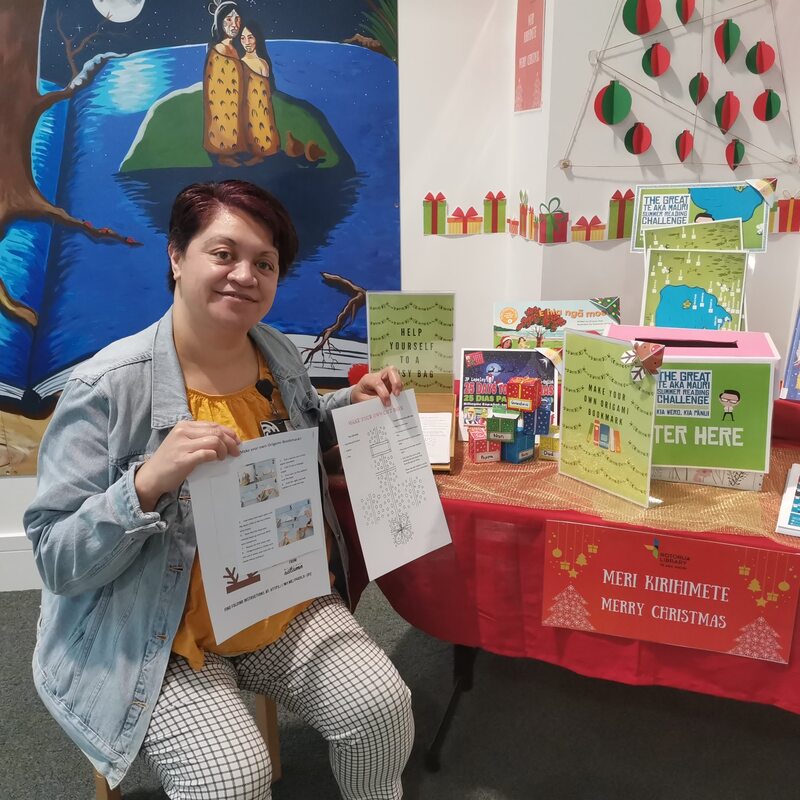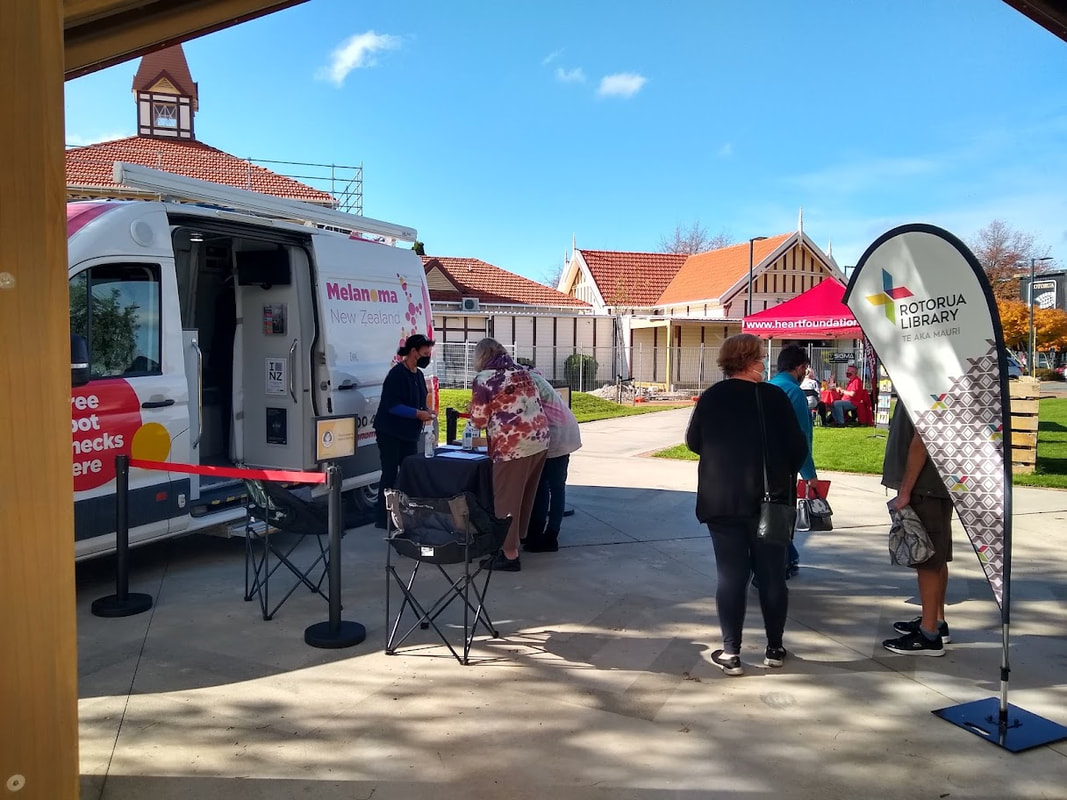TE AKA MAURI - ROTORUA LIBRARY
|
“This place saved my life over the last three years”. Words like these confirm we are making a difference to the wellbeing of the Rotorua community. They were spoken by a young migrant woman whose husband and young son were still in India. She lived in a hostel room while studying for a degree and Te Aka Mauri provided a sense of home during their three-year separation. She spoke the above words to a woman in her late 60s who had brought her husband to participate in his weekly Dementia Reading Group. These two women built a friendship in Te Aka Mauri, one that helped them both with the loneliness and isolation that comes from having your nearest and dearest overseas or in a declining state of health.
ONE-STOP-SHOP FOR CHILDREN’S HEALTH With Rotorua Lakes Council and Lakes DHB both seeking vibrant and innovative solutions for a new library and one-stop-shop for children’s health in 2015, the decision was made to pool resources and create a venue that was safe, welcoming, and central. The outcome of that decision was Te Aka Mauri – the community hub that is now home to Rotorua Library and the Children’s Health Hub. Our name and design reflect the shared vision to create a facility of excellence to advance community wellbeing. Te Aka Mauri sits on land gifted by Ngāti Whakaue when the city of Rotorua was built. Whānau enter the building and walk through the children’s library to attend their appointments. The child will often see their clinician and receive a wellness check such as dental or hearing at the same appointment, saving parents and caregivers from having to visit several times. Wellness continues to be a strong driver in all we deliver at Te Aka Mauri, based on our shared goal of creating a space of wellbeing and learning for our community, breaking down barriers, and empowering people to prioritise their health. |
 Piles of busy boxes
Piles of busy boxes
RESPONDING TO THE COVID ENVIRONMENT
Following the first COVID lockdown in 2020 our Youth and Early Learning team identified that families still wanted to be involved in activities with the library even if they couldn’t attend in person. The team began developing takeaway craft activities that provided instructions and all the craft supplies needed. These were immensely popular, but we learned that not everyone had the stationary supplies to complete the projects. The team sought funding to create a Big Busy Bag that had multiple activities, craft supplies and stationary needed. It was a Library Holiday Programme in a bag. These were delivered to every child in emergency housing over the 2020/21 summer holidays and delivered again during the latest COVID outbreaks to families who were isolating. Feedback from the community groups we partnered with to deliver these kits has been extremely positive. One group commented that these boxes and bags brought smiles to everyone in the homes visited and parents appreciated people thinking about them in difficult times.
Following the first COVID lockdown in 2020 our Youth and Early Learning team identified that families still wanted to be involved in activities with the library even if they couldn’t attend in person. The team began developing takeaway craft activities that provided instructions and all the craft supplies needed. These were immensely popular, but we learned that not everyone had the stationary supplies to complete the projects. The team sought funding to create a Big Busy Bag that had multiple activities, craft supplies and stationary needed. It was a Library Holiday Programme in a bag. These were delivered to every child in emergency housing over the 2020/21 summer holidays and delivered again during the latest COVID outbreaks to families who were isolating. Feedback from the community groups we partnered with to deliver these kits has been extremely positive. One group commented that these boxes and bags brought smiles to everyone in the homes visited and parents appreciated people thinking about them in difficult times.
 Abigail Wharne, Heritage and Research Lead with some community archives
Abigail Wharne, Heritage and Research Lead with some community archives
HERITAGE AND RESEARCH COLLECTIONS REFLECT ROTORUA’S UNIQUENESS
Our Heritage and Research Collections reflect all that is unique to Rotorua. The rich history of our region is visible through the celebrated resources in the Don Stafford Room and in our community archive, comprising material donated by local groups and individuals. Of particular significance are the difficult-to-find items containing the history of Te Arawa: Don Stafford’s research notes, the Te Arawa collection of books, our map and rare-book collections, and copies of Māori Land Court minute books. Researchers from around New Zealand access these resources to gather the information they cannot find elsewhere.
Our vision is to offer the same level of service to our online learners. We are already making great strides in this area, with the library recently becoming the custodian of Great Te Arawa Stories (GTAS) website. GTAS contains a collection of stories about people, places, and events that are applicable to Rotorua and to the people of Te Arawa. It was developed by Ngā Pūmanawa e Waru Education Trust to introduce learners to Te Arawa stories, to encourage user education skills, support inquiry learning, and inspire the exploration of existing resources. With this aim in mind, the Heritage and Research Team have engaged with local teachers to learn how to further develop the site to meet their needs. During one feedback session, a teacher explained how they had been searching for a resource like this for years: high-quality narratives from a trusted local source. In the coming years, we hope to receive similar feedback about the new heritage platform, which is being developed to showcase digitised items from the heritage collections, and the Many Answers pages being created to support the Aotearoa New Zealand's histories curriculum.
DIGITAL SKILLS FOR PEOPLE WITH DEMENTIA
After long COVID-related delays, we are about to launch a collaborative project that will inform those researching dementia and caring for those impacted by it. In partnership with the University of Auckland’s Faculty of Medical and Health Sciences and Dementia Lakes, our team of digital mentors will be visiting adults with a diagnosis of dementia in their homes to lead them on a journey to gain basic digital skills – perhaps learning how to borrow and read eBooks and watch YouTube videos. The aim is for our learners to be able to make or receive a Zoom call so they can participate in cognitive stimulation therapy at home. We hope to provide Digital Inclusion Alliance Aotearoa (DIAA) with a package of teaching materials that can be added to the Stepping Up platform and be freely used by libraries across the motu.
Our Heritage and Research Collections reflect all that is unique to Rotorua. The rich history of our region is visible through the celebrated resources in the Don Stafford Room and in our community archive, comprising material donated by local groups and individuals. Of particular significance are the difficult-to-find items containing the history of Te Arawa: Don Stafford’s research notes, the Te Arawa collection of books, our map and rare-book collections, and copies of Māori Land Court minute books. Researchers from around New Zealand access these resources to gather the information they cannot find elsewhere.
Our vision is to offer the same level of service to our online learners. We are already making great strides in this area, with the library recently becoming the custodian of Great Te Arawa Stories (GTAS) website. GTAS contains a collection of stories about people, places, and events that are applicable to Rotorua and to the people of Te Arawa. It was developed by Ngā Pūmanawa e Waru Education Trust to introduce learners to Te Arawa stories, to encourage user education skills, support inquiry learning, and inspire the exploration of existing resources. With this aim in mind, the Heritage and Research Team have engaged with local teachers to learn how to further develop the site to meet their needs. During one feedback session, a teacher explained how they had been searching for a resource like this for years: high-quality narratives from a trusted local source. In the coming years, we hope to receive similar feedback about the new heritage platform, which is being developed to showcase digitised items from the heritage collections, and the Many Answers pages being created to support the Aotearoa New Zealand's histories curriculum.
DIGITAL SKILLS FOR PEOPLE WITH DEMENTIA
After long COVID-related delays, we are about to launch a collaborative project that will inform those researching dementia and caring for those impacted by it. In partnership with the University of Auckland’s Faculty of Medical and Health Sciences and Dementia Lakes, our team of digital mentors will be visiting adults with a diagnosis of dementia in their homes to lead them on a journey to gain basic digital skills – perhaps learning how to borrow and read eBooks and watch YouTube videos. The aim is for our learners to be able to make or receive a Zoom call so they can participate in cognitive stimulation therapy at home. We hope to provide Digital Inclusion Alliance Aotearoa (DIAA) with a package of teaching materials that can be added to the Stepping Up platform and be freely used by libraries across the motu.
RĀ HAUORA COMMUNITY WELLBEING
Other initiatives our adult learning, programmes and promotions team are proud of include Rā Hauora community wellbeing day with free health checks from Melanoma NZ, Heart Foundation and Diabetes New Zealand, monthly multicultural lunches celebrating a different culture each month and a death literacy series called Cultural Conversations about Death - so far we’ve learned how death is viewed, prepared for, and celebrated by Hindi and Muslim communities and coming next will be Sikh, Filipino and traditional Māori.
We don’t know how many lives are transformed in Te Aka Mauri, by child psychologists or digital mentors, through holiday programmes in a bag or the connection made through discovering whakapapa. But with strong partnerships, and capable members of our wider Te Aka Mauri whānau, we strive to look beyond traditional library services to enhance lives and give hope to our wider community.
Other initiatives our adult learning, programmes and promotions team are proud of include Rā Hauora community wellbeing day with free health checks from Melanoma NZ, Heart Foundation and Diabetes New Zealand, monthly multicultural lunches celebrating a different culture each month and a death literacy series called Cultural Conversations about Death - so far we’ve learned how death is viewed, prepared for, and celebrated by Hindi and Muslim communities and coming next will be Sikh, Filipino and traditional Māori.
We don’t know how many lives are transformed in Te Aka Mauri, by child psychologists or digital mentors, through holiday programmes in a bag or the connection made through discovering whakapapa. But with strong partnerships, and capable members of our wider Te Aka Mauri whānau, we strive to look beyond traditional library services to enhance lives and give hope to our wider community.
June 2022


